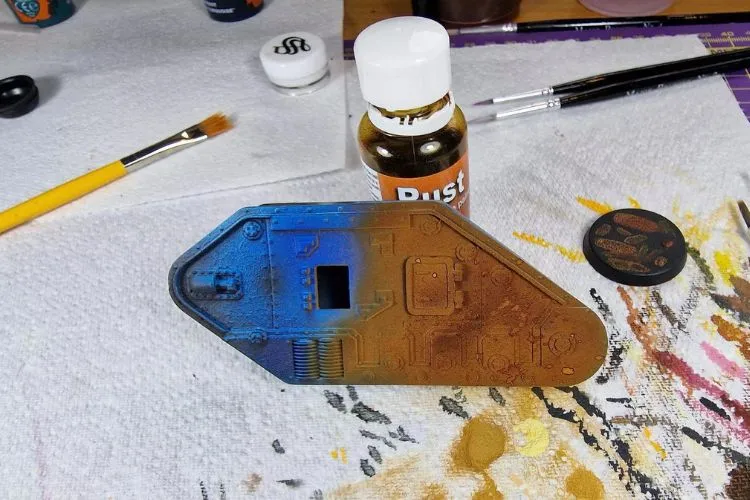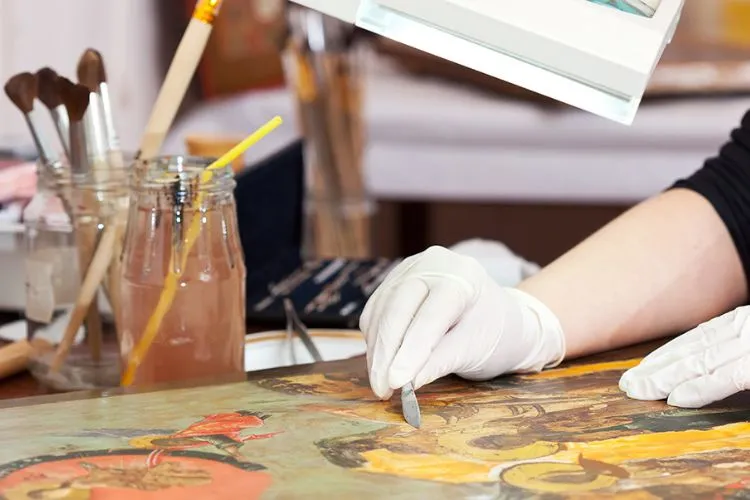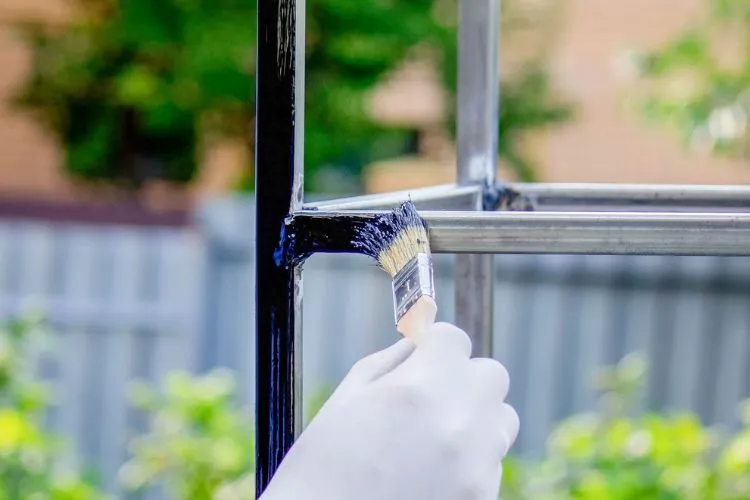Rust is a common enemy of metal objects, leading to their degradation over time. Many seek methods to protect their metal items from rust, and one of the options often considered is the use of paint, specifically acrylic paint. So, does acrylic paint prevent rust?
In this article, we explore whether acrylic paint can truly prevent rust and how it can be applied effectively.

What is Acrylic Paint?
Acrylic paint is a water-based synthetic resin that dries to form a flexible, water-resistant finish. It is popular because it combines some of the best qualities of oil and watercolor paints.
Aside from its artistic uses, it is also valued for its durability, quick drying time, and resistance to the effects of sunlight and water.
Does Acrylic Paint Prevent Rust?
The primary question is: Does acrylic paint prevent rust on metal surfaces? To address this, it’s important to understand that rust occurs when metal is exposed to oxygen and moisture. Acrylic paint can act as a barrier against these elements.
By covering the metal, acrylic paint reduces the metal’s exposure to oxygen and moisture, thus slowing down the rusting process.
However, it’s crucial to note that acrylic paint alone does not guarantee complete rust prevention, especially under harsh conditions.
Preparing Metal for Acrylic Paint Application
Proper preparation of the metal surface is key to enhancing the rust-preventive properties of acrylic paint. The metal should be clean and free from any existing rust, grease, or dirt.

You might need to use a wire brush or sandpaper to remove rust and a degreaser for oils. Once cleaned, applying a primer specifically designed for metal can help the paint adhere better and last longer.
Application Tips for Acrylic Paint on Metal
When applying acrylic paint to metal, apply several thin layers, allowing each layer to dry thoroughly before applying the next. Using thin layers helps prevent the paint from running or sagging and ensures a more even cover.
It is important to apply the paint in a well-ventilated area and use a sealant after the paint has dried to further protect the surface.
Limitations and Considerations
While acrylic paint can help delay the onset of rust, it is not a permanent solution. In environments with high humidity or frequent exposure to water, the protective layer may degrade faster.
It is also important to regularly check the coated metal for any signs of damage or peeling paint, which could expose the metal to air and moisture.
Alternative Rust Prevention Methods
Besides acrylic paint, other methods can also prevent rust efficiently. These include using oil-based paints, which often provide a stronger barrier against moisture; applying a rust converter, which turns rust into a chemically stable form that doesn’t worsen; or using a physical barrier such as plastic or silicone covers.
Each method has its own set of advantages and suitability depending on the situation and type of metal.
Best Practices for Acrylic Paint Maintenance on Metal
Maintaining the integrity of acrylic paint on metal surfaces is crucial for ensuring long-lasting rust protection and aesthetic appeal.

Regular maintenance not only keeps the metal looking fresh but also extends the lifespan of the paint job, providing sustained resistance against the elements that cause rust.
Cleaning
Regular cleaning is vital for removing dirt, grime, and other substances that can accumulate on painted metal surfaces. Use a soft cloth or sponge and a mild detergent mixed with water to gently clean the surface.
Avoid abrasive tools or harsh chemicals, as these can damage the acrylic paint. After washing, rinse the surface with clean water and dry it thoroughly to prevent any moisture-related issues.
Inspecting
Periodically inspect the painted metal for any signs of wear or damage, such as cracking, chipping, or fading of the paint. Pay special attention to areas exposed to higher levels of environmental stress or mechanical wear. Early detection of such signs can help you address potential problems before they lead to rust.
Touch-Ups
When you notice minor damages or wear on the paint job, prompt touch-ups are necessary. First, clean the affected area and lightly sand it if needed to ensure good adhesion of the new paint.
Then, apply a thin layer of matching acrylic paint, following the original application guidelines. For better results, apply a primer before the paint if the metal is exposed.
Reapplication Signs
More extensive damage or significant fading indicates that a complete reapplication of the paint may be needed. If the protective layer is compromised, such as by peeling or large cracks, it’s imperative to remove the old paint, properly prepare the surface again, and apply a fresh coat of paint.
By adhering to these best practices for acrylic paint maintenance on metal, you can effectively protect your metal objects from rust, ensuring they remain both functional and visually appealing for years to come. Regular, attentive care is the key to preventing rust and prolonging the life of the paint job.
Frequently Asked Questions (FAQs)
Does acrylic paint prevent rust on all metals?
Acrylic paint can be used on most metals, but its effectiveness can vary depending on the type of metal and the environment.
How long does the rust prevention last with acrylic paint?
This largely depends on the paint quality, the environment, and how well the metal was prepared. Regular maintenance can extend its efficacy.
Can you apply acrylic paint over existing rust?
It is not advisable as the rust can continue to develop underneath the paint. It is best to remove all rust before painting.
Is there a special type of acrylic paint for preventing rust?
While no acrylic paint is specifically designed for rust prevention, products formulated for outdoor use or with added UV protection might offer better durability and protective qualities.
Conclusion:
Acrylic paint can be a useful tool for reducing the risk of rust on metal surfaces. It acts as a barrier against moisture and oxygen, the two critical elements in rust formation.
However, the effectiveness of acrylic paint in preventing rust depends on proper application, environmental conditions, and regular maintenance.

Meet Isabella Anderson, your acrylic painting mentor with over a decade of brush-wielding mastery. Dive into the colorful world of acrylics with her expert guidance, featured exclusively on ‘Acrylic Authority.’ Unleash your inner artist and explore the limitless possibilities of this versatile medium alongside a true acrylic aficionado.
